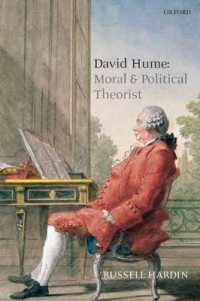- ホーム
- > 洋書
- > 英文書
- > Science / Mathematics
Full Description
In a work that defies caregory, the remarkable John Lukacs has combined science and philosophy to open our eyes to accept our need to know, our purpose for knowing, our response to the world. Here is his opening statement:what seems to be the beginning of a new age, for which postmodern is an inadequate word. A great change after about 500 years.There are two (and for some of us, three) reasons why we should acknowledge our centrality. They have inspired and compelled me, after considerable hesitation, to write these words.WITH THIS RECOGNITION I KNOW THAT, although I remain in a small minority, I am no longer entirely alone. I am speaking of the uneasy realization that the so-called scientific view of the universe is insufficient. It is not enough to make this argument on moral or religious or metaphysical convictions alone. There are ample evidences that the scientific or materialistic or deterministic explanations for the world that we know are at best incomplete or at worst insubstantial. The achievements of science during recent centuries have been immense, of course. But in the past 200 years, more and more people, including scientists, have come to the conclusion that the science pertaining to the subjects of their knowledge is imperfect, and probably inevitably so. (Note, too, that the word science has narrowed to mean the science of nature; the word scientist became current in English only after about 1840.)We ought to recognize that one of the main applications of material science, technology, depends on a single limited function of causality, what we call mechanical causality, which Aristotle called efficient cause and defined as but one of four causalities. (The other three are material cause, formal cause, and final cause.) Mechanical causality means that the same causes must necessarily result in the same effects. That is the inevitable condition of machines-while at the same time it is incomplete, because it excludes the presence or participation of any kind of nonmaterial or nonmechanical element. A recent statement by the poet Wendell Berry is most appropriate here: he wrote that in the near future the great division of mankind may be between people who think of themselves as machines and people who think of themselves as creatures. His statement brings me to my argument that the earth is at the center of the universe.







